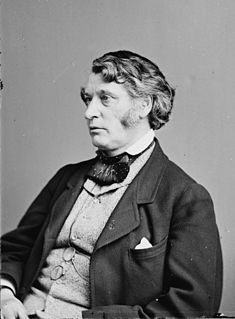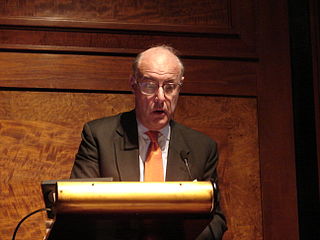Top 72 Monarchs Quotes & Sayings - Page 2
Explore popular Monarchs quotes.
Last updated on April 18, 2025.
I shall always rebel against any attempt to reduce a human being to a kind of mannequin, whose deeds and questions would be comprehensible like the deeds and gestures of monarchs recorded day after day in official communiques. Six months of a life cannot catalogue the vitality, the activity of an individual; only death stops development and then, what is important is the overall meaning of a life, not the details of that life, edifying to some, scandalous to others.
All of us have monarchs and sages for kinsmen; nay, angels and archangels for cousins; since in antediluvian days, the sons of God did verily wed with our mothers, the irresistible daughters of Eve. Thus all generations are blended: and heaven and earth of one kin: the hierarchies of seraphs in the uttermost skies; the thrones and principalities in the zodiac; the shades that roam throughout space; the nations and families, flocks and folds of the earth; one and all, brothers in essence-oh, be we then brothers indeed! All things form but one whole.
Wealth from trade was the mainspring of Western material advance; the visible agents of change were great guns. These came of age in Europe in the 15th century. On land their potency in reducing castle walls favoured central over local power, since in general only monarchs could afford siege-trains; so nation-states were consolidated and extended into great territorial empires. At sea, guns transformed sailing ships into mobile castles virtually impregnable to opponents who lacked equally powerful ordnance. With the ocean-going gunned warship, western Europe began to extend around the globe.
The enthronement of Christ over the minds of men is steadily going forward. His kingdom embraces the princes in the realm of mind. It embraces the nations of highest civilization. They are all beneath the cross. It is maintained by simple authority. Other mental monarchs rule by logic; Christ's word is law--it is satisfying to His subjects. His truth in the hands of His disciples, like the bread He broke upon the mountains, is an ample supply for the millions that gather at His table.
The highest greatness, surviving time and stone, is that which proceeds from the soul of man. Monarchs and cabinets, generals and admirals, with the pomp of court and the circumstance of war, in the lapse of time disappear from sight; but the pioneers of truth, though poor and lowly, especially those whose example elevates human nature, and teaches the rights of man, so that "a government of the people, by the people, for the people, may not perish from the earth;" such a harbinger can never be forgotten, and their renown spreads co-extensive with the cause they served so well.
Cruel and paradoxical though it undoubtedly is, the record shows that yje most succesful 20th century monarchs have been those who were not actually born to succeed. King George VI was 41 when the abdication of Edward VIII propelled him suddenly and unexpectedly to take up the crown; and Queen Elizabeth II spent her first decade with no inkling thay she herself might one day have to reign. Taken together, these examples suggest that the best preparation for the job of sovereign is not to be prepared for it at all, ir not to be too well prepared for it, or for too long.
Monarchs not only fashion their age, but are fashioned by it, so that they can become a sort of personification of the age. If Elizabeth I, independent, strong, represents the age of Shakespeare's heroines, a woman's heyday, Victoria represents another image of womanhood, predominant in the nineteenth century: a woman who, although queen in her own right, leaned on her husband, looked up to him, and went into perpetual mourning after his death. The feminist movement filled her with shocked horror and outrage.
There was about all the Romans a heroic tone peculiar to ancient life. Their virtues were great and noble, and these virtues madethem great and noble. They possessed a natural majesty that was not put on and taken off at pleasure, as was that of certain eastern monarchs when they put on or took off their garments of Tyrian dye. It is hoped that this is not wholly lost from the world, although the sense of earthly vanity inculcated by Christianity may have swallowed it up in humility.
We don't know how Cleopatra spent her days, but we do know how other Hellenistic monarchs spent their days. There has been a great amount of scholarship in the last 30 years about education in the Hellenistic world and women in the Hellenistic world. We now know how an upper-class woman was educated in her day.
Tax time approaches, and Americans are as always paying H & R Block billions to help them save some of their wealth from their ravenous government. Pitiful, in a way: it underlines the grim but
unacknowledged fact that the government is their enemy and they have to hire protection from it. But don't we enjoy 'self-government'? Well, if we have it, I'd hardly say we enjoy it. True, we aren't being taxed by the monarch of Great Britain, but our American-born rulers claim far more of our wealth than the British monarchs ever did.
How shall I admire, how laugh, how rejoice, how exult, when I behold so many
proud monarchs groaning in the lowest abyss of darkness; so many
magistrates liquefying in fiercer flames than they ever kindled against the
Christians; so many sages philosophers blushing in red-hot fires with their
deluded pupils; so many tragedians more tuneful in the expression of their
own sufferings; so many dancers tripping more nimbly from anguish then
ever before from applause.
Oliver Cromwell (1599-1658) moved from a legitimate to a charismatic role, reversing the course followed by Washington. Yet therewere surface similarities in their careers. Both led military rebellions against English monarchs--Cromwell against Charles I, Washington against George III. Each took local militia--the "train bands" of Cromwell, the colonial levies of Washington--and forged professional armies on a national scale. Each infused a new ethos in his troops--a religious spirit in Cromwell's case, a post-colonial American identity in Washington's.










